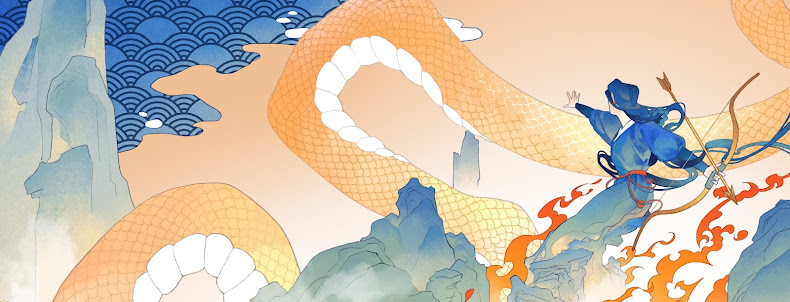Earnshaw
Books will soon be publishing Finding the
Way: A Novel of Lao Tzu as part of its Old
China Historical Fiction Series, following the publication of The Green Phoenix. The expected
publication date is 1st April, 2018. I am very excited to have the
opportunity to interview the author, Wayne Ng.
As suggested by the title, this
historical novel is about ancient Chinese philosopher Lao Tzu. We all know that
Lao Tzu was purported to be the seminal founder of Taoism thoughts and that the
ideology expressed in Tao Te Ching
has had far-reaching influence not only on Chinese culture, values and beliefs,
but also on Western philosophical studies. Wayne’s fictionalized account of the
life of this revered intellectual promises us a great opportunity to peer
inside his mind and soul and to be transported to China’s tumultuous Spring and
Autumn period, some twenty-six centuries ago.
Without
further ado, onto the Q & A session!
Alice: Hi Wayne! Thank you for taking
the time to do this interview. Why did you choose Lao Tzu for your first novel?
What is it about him that resonates with you?
Wayne: I was inspired by the image of
Lao Tzu, who after a lifetime of regrets, wandered off to die. I imagined him
to be very much like myself---a dreamer, an idealist, one whose social
conscience underpinned all that he was. He is a figure of such veneration yet we
know so little of him. To my knowledge, he hadn’t ever been dramatized, so I saw an opportunity to
literally put some flesh into the legend of someone as relevant today as ever.
Alice: There are two ways to do such a
book – write it as a story, or as a reflection of philosophy. How did you do
it?
Wayne: Lao Tzu would answer that a
natural equilibrium answers all. Here I applied a similar paradigm by juggling
the narrative and the development and application of the philosophy. Dyed in
the wool Taoists will find many elements of their beliefs woven into the story.
Those just learning about Taoism will get the primer without feeling lectured. While
the story preceded the principles, the two became intertwined. Lao Tzu created
Taoism in order to make sense of the disorder around him. His story and his
beliefs evolved naturally, organically. I like to think he wouldn’t have wanted
it any other way. In the end it became a balancing act of integrating selected
timeless Taoist notions into a personal odyssey.
Alice: To what extent is the story
anchored to history as it is known?
Wayne: We
know that pre-dynastic China was
tumultuous, but also a period of significant change and enlightenment. The
bronze age was morphing into the iron age. The Zhou House had long since
fragmented into smaller, warring kingdoms. Lao Tzu and Confucius challenged the
existing order and were often treated like rock stars, but likely also as
pariahs by others. That they supposedly met in the Royal Court is one of the
few known details of Lao Tzu. However legends also give us the opening chapter
where Lao wanders off to die on a water buffalo, only to be stopped by Yin to
tell his story. While precise details are often sketchy, characters such as the
Princes and the Kings, place names, and the construction palaces and cities are
a matter of record. Like any good historical fiction writer, I’ve delicately
seasoned facts with creative essence.
Alice: What connections or lessons are
there in Lao Tzu and the story as you tell it in “Finding” for people today?
Wayne: Imagine a world spinning too
fast. People feeling alienated, disconnected, insecure, unable to find solace
in each other or governments, leaders without a moral or altruistic foundation…this
isn’t 6th century BC, but here and now. The historical context of
FTW was written to synchronize with similar modern questions today. The
emptiness and imbalance Lao Tzu spoke of then weighs us down as heavily then as
it does now. However he also offered a soothing balm through Taoism
that gateways into an inner peace and harmony that’s as relevant and necessary
now as it was then.
Alice: You are of Chinese ancestry but
born in Canada. How did that background influence you, do you think, in terms
of your choice of the story and the nature of the plot?
Wayne: It’s disappointed me that most
historical fiction is “Eurocentric”. Fantastic Chinese stories about massively
influential people and world influencing periods such as Lao Tzu, are waiting
to be discovered. Being of Chinese heritage I understand there is something in
the DNA of the Chinese, whether you live in China or as part of the diaspora.
There is a sense of duty to family, acceptance of authority and order, a
feverish practicality, a survival instinct that has kept the culture intact for
thousands of years. I understand this inner rumbling, but also the yearning for
a quietude that is best found through inner reflection.
Alice: The book involves a confrontation
between Lao Tzu and Confucius. Both had a huge impact / influence on Chinese
culture. How would you describe that influence?
Wayne: The genesis of both giants came
from the chaos of constant conflicts with the goal of self and societal
improvement. Confucianism sought to ingratiate harmony social order and
hierarchies through filial piety, and a clearly defined moral code. Lao Tzu
would have argued that order and harmony are achieved only through an inner
journey without undue, unnatural and extraneous influences. I believe that many
Chinese live within Confucianist order but quietly believe in and even yearn
for the peace of the Tao/the Way.
xxxxx
Many thanks to Wayne for his insightful answers to my questions.
Earnshaw Books will be releasing the
digital versions of “Finding
the Way: A Novel of Lao Tzu” on April 1, 2018. The paperback version will be
available on July 1, 2018.



